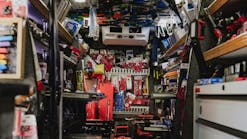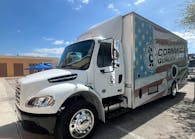When independent distributor Scott Maroney discusses his favorite thing about the tool business, it boils down to one word: Interaction.
“I get to see a little glimpse of everybody’s life every week,” Maroney says of his customers. “You get to see 52 glimpses of their life a year, and you get to see everybody.”
“Selling tools is just a bonus,” the Largo, Florida-based tool distributor adds. “It’s the interactions with these guys.”
Maroney has an added connection with many of the technicians he serves, because he used to be one.
“I’m not a salesman,” he says. “I’m a mechanic that drives a tool truck.”
“When I was a mechanic, the last 10 years at the dealership, I was the shop foreman,” Maroney says. “I was in charge of 16 to 18 mechanics. I know mechanics, I‘ve heard all their stories. This is the fun part of my job, seeing all these different people. It’s a lot, but it’s fun.”
Maroney’s route services Pinellas County, Florida, home to Largo and Clearwater. With a population of nearly 1 million people, the county sits on a peninsula about 12 miles across. The draw of world-renowned beaches make tourism the primary economy.
About 90 percent of Maroney’s customer base is made of automotive service facilities - which includes body shop, independent repair and dealerships. The other 10 percent consist of a variety of specialty shops including a forklift company, core drilling company, fleets, etc.
From tech to independent
Maroney got his start in the automotive business securing an internship with a local Oldsmobile dealership while still in high school. After nearly three decades of turning wrenches and managing the shop operations at a dealership, Maroney debated starting his own independent repair shop, or selling tools on a tool truck.
“It would have been a real easy progression to go from the dealership to the shop, but I was just burnt out,” Maroney says. “You know, as a mechanic you’re bent over, you’re beat up … It’s rough on your body.”
“My wife (Stacey) pushed me to do this. She said, ‘You’re really good with people, you ran the Nissan dealership for the last 10 years and handled all aspects of everything. Use your brain, not your body. Be smart.’ ... I kind of jumped into it.”
While he did research the flags, Maroney says he found the turnover rates of previous franchise routes in his area to be unsettling, ultimately deciding to establish his own independent business.
He remembers not knowing the first thing about how to get into the business.
“I decided to do my own thing, and I didn’t know what I was getting myself into,” Maroney confirms. “I called ISN out of the blue. They hooked me up with Matt Sadler, one of their sales reps, who is great. He is ‘Mister Energy.’ He met me at our shop the next day, and he sold me on it.”
In the beginning
Maroney attended the ISN Tool Dealer Expo, just before hitting the road in July 2011, at the request of his sales rep, Sadler.
“I had a blast,” Maroney says. “I bought a whole bunch of tools to fill up my truck – not knowing what to buy. Stupid things that took me years to sell. That’s how I got set up with the first tool show – I got set up and loaded up my truck with a whole bunch of stuff.”
While he did have support from his sales rep, Maroney didn’t have the traditional resources afforded by someone new to the tool business.
“It was a learning curve for me,” Maroney says. “I didn’t have a rep from a [flag] riding with me telling me what to do, what numbers were good, how you were supposed to do things.”
Maroney has two grown sons who work as repair technicians – one at a dealership, and the other at an independent repair shop. His younger son, Eric, assisted with the business the first few months on the route to help establish a customer base.
The younger Maroney helped his father learn the business management software, MM1, and would stay on the truck and assist with customer transactions. Meanwhile, the elder Maroney would head into any shop he could find to introduce himself and hand out sales flyers.
“I just started driving around,” Maroney says. “We left the shop, the first day with my son, and we pulled into the first little garage I saw, introduced myself and we just kept going.”
“That wasn’t how I did well,” he adds. “How I did well was word of mouth.”
As Maroney continued to service customers, some technicians would move to other shops where he would then stop. He says others would see the truck driving around and ask him to stop at a nearby shop. One customer – who ended up being one of best – even flagged Maroney down at a stoplight to visit his shop down the road.
Customer approach
Maroney does not see himself as a salesman.
“The way I look at it, I had 29 years of training in the dealership to be a tool guy,” he says. “I know mechanics – I know what they breathe, what they think, how they live. Their lifestyle. I am one. I’m a mechanic that drives a tool truck.”
While he will distribute flyers on a regular basis, Maroney rarely, if ever, brings product into the shop. He doesn’t like to be pushy.
What Maroney enjoys most is interacting with the customers. He likes to learn about their lives and see them on a regular basis to get to know them. With Maroney’s vehicle repair background, he says he can easily relate to and connect with his customer base.
A lot of his business is networking – which has also helped him add additional stops to his route.
When Maroney adds a new stop, the first thing he does is talk with the individual in charge to let them know he will be stopping by and to give a heads up about the tool truck.
“When I go to a new store or there is a new manager, especially at dealerships, the first thing I do is go in and introduce myself to the service manager or the shop owner,” Maroney says. “I introduce myself and say, ‘Hey, this is what I’m doing. I just want to introduce myself and let you know I’m not going to take any of your guys’ time. I will try and get them in and out of the truck and back to work as fast as possible.’”
“I’ve had a couple service managers come up to me a month or two later and say, ‘You know, Scott, you’re the only tool guy that has ever introduced [himself].’”
Maroney will follow up with shop management on a regular basis to ensure he is meeting the shop needs as well. This helps him maintain his presence in the shop, and also allows him to take any potential shop orders.
“You can’t be pushy, you can’t be in there every week. They’re busy,” Maroney says of the shop owners and managers. “But if you can do that once a month, real quick, just (re-)introduce yourself.”
Maroney understands how the shops operate, and adjusts his strategy for each stop accordingly.
“The best time to sell tools is when a shop is slow,” Maroney says. “When it’s slow (in the shops), I’m busy on the truck. When the shops are busy, I’m usually the one to come out. I’ll do the legwork and I’m running back and forth getting stuff for them.”
Now, with his ever-expanding customer base, Maroney is also working on time management, to optimize his route.
“It’s always evolving,” Maroney says of his route. “I really try not to add too many new stores, unless it’s a really good customer and they moved to a new place. A lot of times I run out of time by the end of the day. It’s 4:30 or 5 o’clock and I’ve still got five or six places to go.”
Maroney tries to make about 20 stops per day (less if he’s stopping at dealerships, with more customers). To avoid later evenings, Maroney has adapted by evaluating some of his stops, opting to stop on a less frequent basis.
“What I’ve learned, for me to see more customers, I put them on a two-week rotation,” Maroney says.
Financing challenges
Now running his route for more than six years, Maroney confirms the first two years were challenging as he learned how to navigate the business. One of the crucial things he learned in that time was who to finance.
Maroney is now a bit more particular on who and how much he will allow on a customer’s truck account. Vetting customers has come with time, as he has continued to adjust his customer base.
Oftentimes, Maroney will extend credit on his own, by way of a truck account for customers. If a customer is looking to purchase a big-ticket item, he can also use a service called TimePayment. This, however, cannot be used in lieu of a truck account for multiple small purchases over time, like some franchise distributors have access to. This can be a pain point for Maroney.
“It’s not a line of credit,” Maroney confirms, about TimePayment. “If a customer comes on and they want a whole bunch of small stuff, they can’t do that. Now, if you want to buy a toolbox or one big item, I can go through TimePayment and finance them. But that’s far and few between.”
Maroney otherwise must extend credit from his own funds, placing many of his customers on truck accounts.
“It’s not a problem, it’s a challenge,” Maroney says, of his limited options for extending credit to customers. “I’m doing great, I have no problem with it.”
“I could be doing even better if there was some type of financing available,” he adds.
Future of business
The first three years after Maroney started his route, he put in long hours not only on the tool truck, but still turning wrenches on nights and weekends. His says this helped him to establish a successful business, but he could only sustain the workload for so long.
“I got burned out,” Maroney says. “So the last two years I’ve made a conscious effort not to work in the evenings. Or, when I get done at night, I’ll go to the gym with my son or go home with the wife, or work on the house or do something else. I need to get away from the business just a little bit.”
Finding time for himself also involves keeping up with a passion Maroney has had since his youth. On Tuesday and Thursday mornings, Maroney wakes up early to head out on the lake with two friends to barefoot waterski. Those days during the week, he will stay a bit later on the truck.
“I know if I work harder, I can make more money,” he says. “But I’m doing good right now... I’m going to keep it going, but do I need to work 60 hours a week and then go home and do all my paperwork? No. I don’t need to kill myself at this point in my life. I do what works for me.”
As Maroney nears retirement in the next 10 years or so, he says one of his sons could potentially take over the business. But he doesn’t want to put that pressure on his family.
Maroney has also debated putting another truck on the road, but the biggest challenge is finding a suitable and trustworthy driver. He is ambivalent toward the idea of having to manage another truck – including the route, customers and inventory that go along with it.
Regardless of future business possibilities, there is one focus Maroney plans to continue: servicing his customers. He recognizes the changes in their lives as they continue to evolve as well – whether that be getting married, having children, changing jobs, receiving promotions or retiring.
“A lot of my customers … I get to see their life as their growing up,” Maroney says. “There are a lot of good people out there.”



